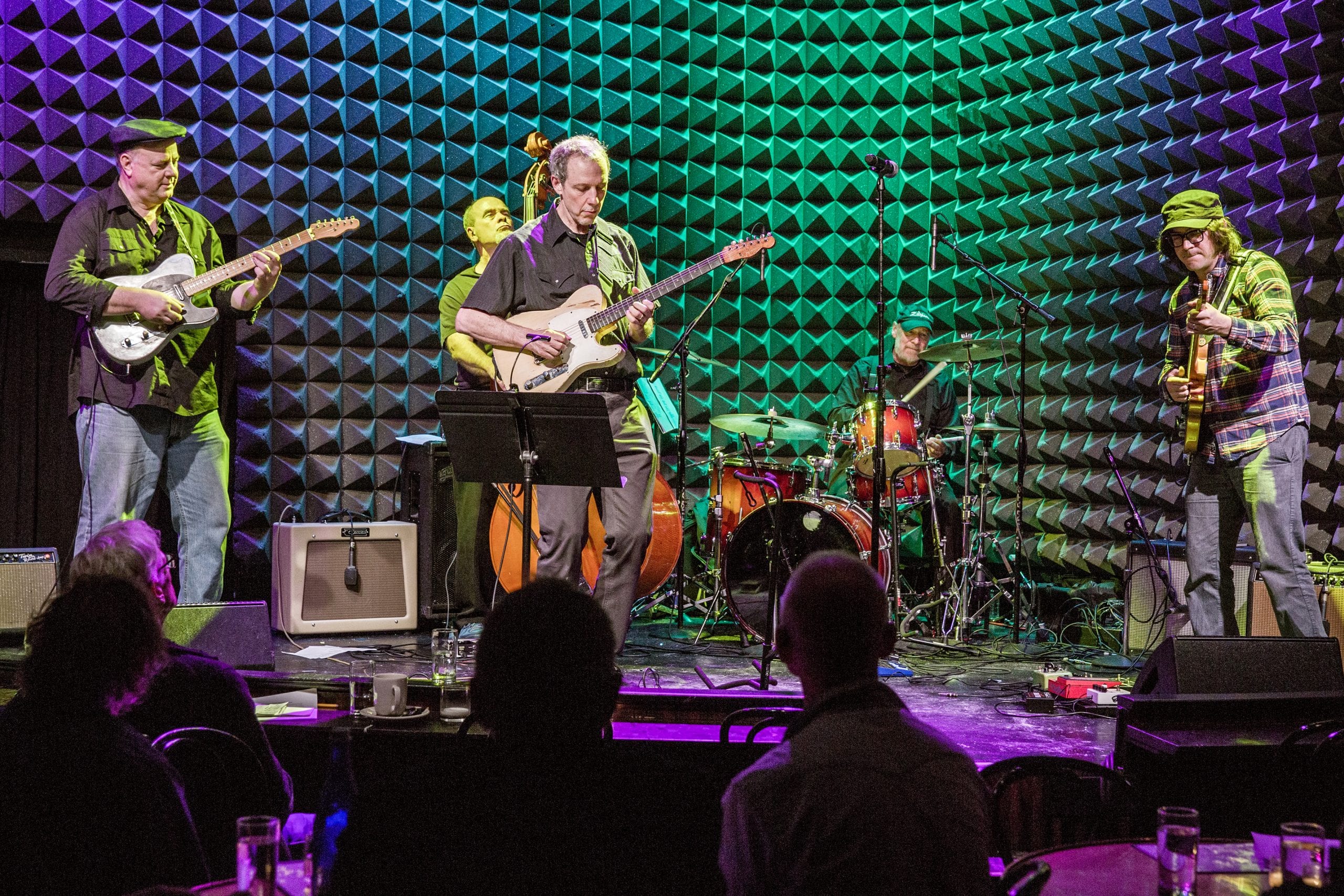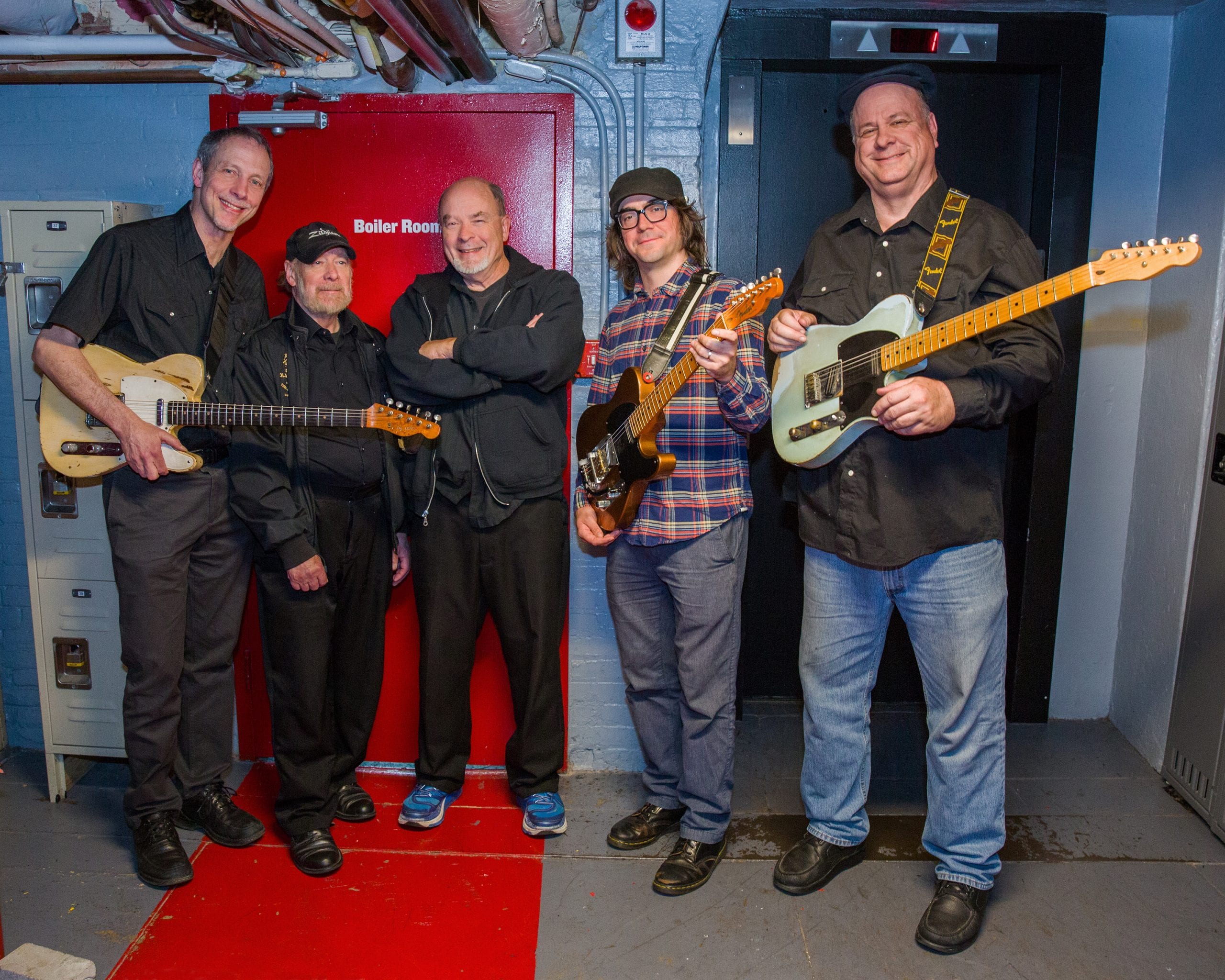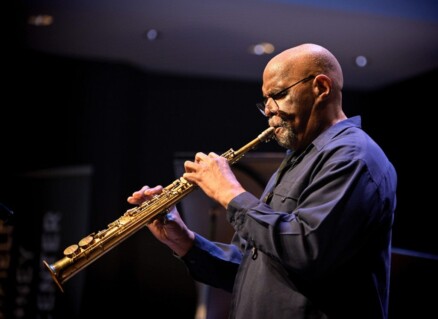The Spellcasters update the guitar sound of the ‘Anacostia Delta’ with tribute to Danny Gatton and Roy Buchanan

Guitarists Roy Buchanan and Danny Gatton were both known for stupefying feats of technical prowess on the Fender Telecaster; both have been called the “best unknown guitarist” in the world; and both called the Washington, D.C. area home in the 1970s and ’80s.
They did not play exactly the same styles, but both played an acrobatic form of rock ‘n’ roll steeped in blues, country, bluegrass and jazz — Gatton called his own style “redneck jazz,” according to biographer Ralph Heibutzki. The two were guitar gods in the region and for devotees across the country. In the recent documentary and concert film Anacostia Delta, bassist John Previti, who played with both guitarists, describes Eric Clapton and Jeff Beck being mesmerized by Buchanan at a local roadhouse. In the same film, country icon Vince Gill describes being “humbled” by Gatton in a cutting contest. Together, Buchanan and Gatton inspired a generation of DMV-region guitarists and helped give the area a signature sonic identity: the “Anacostia Delta sound.”
Now, a group of former proteges and admirers — including three guitarists — is paying homage to these local legends. The Spellcasters feature jazz-rock experimentalist Anthony Pirog, 2010 Guggenheim Fellow Joel Harrison and roadhouse king Dave Chappell, all on Telecaster. Previti and Barry Hart, Danny Gatton’s long-time rhythm section, anchor the triple-guitar threat from below. The group started presenting their interpretations of Buchanan’s and Gatton’s material five years ago at JV’s Restaurant in Falls Church, Va. Their re-workings of classics like “Harlem Nocturne” and “Sky King” reflect their distinct identities as musicians; Chappell’s overdrive weaves with Pirog’s ethereal scrape and Harrison’s more ambient style.
The group’s debut album, called Music from the Anacostia Delta, is out today on Cuneiform Records, and the quintet is celebrating its release with a short tour, which culminates at Blues Alley this coming Monday, May 13. I got the three guitarists on the phone last week to talk about their appreciation for Buchanan and Gatton, how the group works together and the spirit of competition the three players inherited from their inspirations (Gatton, for one, was known as “the humbler”).
This interview has been edited for length and clarity.
CapitalBop: How did each of you first encounter Danny Gatton’s and Roy Buchanan’s music?
Dave Chappell: I heard Roy at a theater in ’75, I want to say, over in Virginia. I went to see Nils Lofgren and, lo and behold, Roy opened the show and I just couldn’t believe it: all these innovative techniques he was doing. I was talking to a guy in the audience and saying, “Wow! Is there anybody even remotely this good?” And the guy mentioned Danny’s name. So, I sought him out. I found him playing down in Waldorf, [Md.,] with some guys and just started kind of following him around. Then I played with him in 1980; that was the first time I actually played with him. How about you, Joel, Anthony?
Joel Harrison: I never really heard Roy Buchanan in Washington, D.C. The influence Roy had was not an early influence on me; I was just so enamored with Danny Gatton, I thought, “I really don’t need to go any farther than trying to figure out what this guy is doing,” in terms of a hometown hero. I met Danny just because I heard about him and went to see him play constantly between 1973 and ’77, or 1980, when I would come back into town. Then I kind of discovered Roy later in life, after he died.
Anthony Pirog: I guess I first heard Danny Gatton when I was about 12. My aunt brought over a CD and it was Cruisin Deuces’ — she was friends with Ed [Eastridge], who recorded his earlier stuff. I remember “Harlem Nocturne” coming on and just getting really excited because I had never heard guitar playing like that before. So that was the first time I heard Danny Gatton and I never got to see him live, but soon after that I started just digging around, listening to Danny’s records, and then I found out about Roy Buchanan and got into that playing as well.
‘The sound man came over kind of yelling at us, Danny in particular, and going, “You guys are way too loud for this room. You’ve got to do this and this.” And Danny, as soon as the guy walked away, he just looked at me and went: “I’ve heard that before, I’ve heard it again. I’m gonna go get a beer. How about you?”‘ —Dave Chappell
CB: You all have some history with the music, so I want to know if you’ve discovered where it comes from. This “rockabilly jazz,” whatever you want to call it: Where does it come from?
DC: What they talk about in the movie, the Anacostia Delta film, how this area is just kind of a melting pot. You had country guys, you had jazz guys, you had R&B, and if you were a working musician, you kind of were expected to have a hand in all of those things. Guys like Danny, who were just exceedingly curious about all these things, just wanted to make a hybrid of it. He liked country; he could play all that stuff. He liked jazz; he could play all that stuff. And he just wanted to be free to mix and match all this stuff on the fly. That rubbed off on all of us to an extent and, in a bigger way, the whole area. Joel, you want to add onto that?
JH: The first thing to say is: I think everybody would agree that Danny Gatton was a singular individual that is really impossible to make too many comparisons to any other thing or anybody else based on his life — because nobody played like him and nobody ever will. But if you take a broader look at the area and what could create a person like that, and others who kind of followed in his footsteps and preceded him, I think it had to do with geography. Washington is poised right between the North and the South of the country, and the various regional styles that exist in American music all had a voice in there by nature of the fact that Washington was a cosmopolitan big city that would attract people from the North, South, East and West of it. I think also that we — Dave and I — grew up in a time where my earliest memories involve wanting to throw the doors open to every kind of music and being fascinated by every kind of music and wanting to find a way to bring it all together. That was kind of new back then, things were still very much in camps; there’s the jazz guys and the country guys and the R&B guys. … All my friends who were around back then saying, “Yeah! Let’s bring it all together!” and then Danny exemplified that but with such an unapproachable, technical facility that it made us all kind of have to find our own way to do it. We couldn’t really play his licks.
AP: To me, he was always a master of every kind of guitar style in popular music up through the ’80s. When I think about it, he was really of the age when rockabilly — he was a young boy when early rock ‘n’ roll was on the radio. When I was that age, Nirvana was on the radio, so to go back and dig into that took some effort. So, he kind of lived through the progression of popular guitar styles.
CB: Joel, is that why Danny and Roy never really caught on outside of Washington, D.C. or beyond in-the-know musicians — because the music was so uniquely of and for this area?
JH: I hate to be too broad in my statements, but very little that’s good does [catch on], so why would we think somebody like Danny would become a household name? Who did? Almost nobody, and if they did, it had a lot to do with things that had nothing to do with music. I don’t think he really played commercial music. It was great music and it was great guitar playing, but that’s never been enough to sell millions of records. You got to have the look … you got to want that too, and he didn’t really want that. He was a little like Wes Montgomery: He just wanted to play the goddamn guitar, you know?
DC: Well said there, and he had a certain — in a good way for us, anyways — maybe not a major career. But he had a kind of rebel, redneck attitude about things too. He’s like, “I’m gonna do whatever the fuck I want to do. I don’t give a shit.”
JH: Tell him that story that you told us Dave, about the guy who told Danny he was too loud.
DC: Oh yeah! The first time I played with him — this is just his typical, flip thing — we played at The 8×10 in Baltimore, and the sound man came over kind of yelling at us, Danny in particular, and going, “You guys are way too loud for this room. You’ve got to do this and this.” And Danny, as soon as the guy walked away, he just looked at me and went: “I’ve heard that before, I’ve heard it again. I’m gonna go get a beer. How about you?”
CB: Even though Danny and Roy’s music is the reason we’re talking, we should talk about your group. Joel and Anthony, how did you two playing at JV’s come about in the first place? I’m also curious, Anthony — had you been looking for an avenue to explore this music and just not been able to?
AP: Yeah, I had been wanting to play this music out for a long, long time, and I’ve been working on it since I was about 13. Around that time, Guitar Player magazine released a transcription of “Harlem Nocturne,” and after my aunt played me the track she was like, “If you can play this note-for-note, I’ll buy you a guitar.” I learned it — but she never bought me the guitar.
DC: Awww man, I never knew that story!
AP: So yeah, I’ve been working on it since my early teens, but I didn’t start playing it out until maybe four or five years ago. I was going to see John Previti play with Rick Whitehead in high school and Barry [Hart] was playing with them too, and I’d go to see Dave at JV’s all the time. When I got back from music school, I started hanging around JV’s and everyone that was playing there — like Joe Stanley, Jim Stephenson and Dave Elliott — they were all really kind to me. Like Billy Hancock, they would all let me sit in and sometimes they’d let me sit in for the whole show. I thought that was really nice of them and I was excited to get to play with them and in this style. I started leading my own group four or five years ago just to honor the music because it’s from this area, which is important to me, and have my own take on it. Dave, I don’t think we played together until I played with Joel, right?
DC: Right, I don’t think that had happened before. We’d bump into each other once in a while, I’d see you at JV’s and just say hi to you … and Dave Elliott just kept talking about this kid Anthony, he says, “Kid Anthony, man that guy’s great!” I was like, “Who’s Kid Anthony?” Then I heard you and said, “Damn! David’s right! Look at that guy, he’s gonna poke my eye out!” But Joel, you go ahead — you had the gig at JVs with Anthony.

JH: Well at some point, Anthony and I realized that there was a lot we had in common. I think he heard one of my projects and introduced himself and then he said, “Why don’t we do a double bill.” He did that group he just mentioned, the sort-of tribute to Roy and Danny and all that other music you were playing at IOTA, and I would play with my band. Then I started asking Anthony, when I would go down and play, if he would sit in with us at Bohemian Caverns. Then we realized we like all the same stuff: This is the first person I’ve met that appreciates my eccentric sense of modern jazz and my roots, because we’re from the same place. I think Anthony said, “Let’s play at JV’s!” And I was so excited because I’d never been there — that all was happening after I left town. I was like, “We’re gonna ask John Previti to play” and Anthony was like, “No! I’m too scared to play with him.” “Come on man, he’s just another guy. I know what you mean, but we just have to forget that Danny ever existed when we play with him.” … I don’t know why [drummer] Jack O’Dell did the gig, I think because Anthony asked him, and then, all of a sudden, John said, “Well, there’s this other guitar player wants to come by named Dave Chappell, and he knew Danny.” So, you know, Dave sat in and it was like, “Wow, this is really fun. Three guitars!”
DC: “Let’s do it some more!” That’s pretty much what happened. I remember being very impressed with everybody, and I had been sick and had a hospital stay, so I was thinking, “Maybe this will bring me back to life.” And sure enough.
‘The music is fun. You know, modern jazz isn’t always fun; this is fun and I think people respond to that.’ —Joel Harrison
CB: Is the sound you have now a product of months or years of playing together, or was it like that from the first time you plugged in and played?
DC: I think it kind of sounded that way right out of the box, because we haven’t played together all that much.
JH: I agree.
AP: I’m with you on that one, except for maybe a few arrangements on the record.
JH: That’s right. We decided, “Let’s put a few lines and demarcation points in here.” And it’s still very much a live sound, but we wanted to bring some arranging into it.
CB: What was the intention in the arrangement? I know the goal was to honor Danny and Roy but not copy them — how did you walk that line?
JH: Trying not to think about Danny.
DC: [Laughing] That’s good! Just coming, in a general way, from that place where you’re still mixing things up. And I think one of the things that makes it work is that between the three of us, there is a variety of styles; and the songs that we chose, there’s a variety of tunes and style within that. I don’t know how to exactly articulate the question, but it just kind of happens that way where we’re just kind of coming from that place, and other influences we have, and we just kind of weave in and out of each other while we’re playing.
CB: How do people react to the music, whether they’re purists who grew up with Danny and Roy’s sounds or newly initiated?
JH: Well I think one of the things I notice — which, I will confess, is not always the case at my performances — we have an incredible amount of fun. The music is fun. You know, modern jazz isn’t always fun; this is fun and I think people respond to that. Am I right about that?
AP: Yeah!
DC: Yeah, and the energy, I think the energy thing with the band is pretty contagious. Anthony is a pretty high-energy player and gets us all — I get more excited when I hear you guys!
JH: I’ll hear one of these guys solo and think, “You motherfucker, I’m gonna give everything I have to this solo and show you up!”
DC: I remember you saying that after Anthony — you played something great, and then Joel went, “Did you hear what he just fuckin’ did?”
JH: I put all my best shit out there on that solo and he has to go do that!
Anthony Pirog, Danny Gatton, Dave Chappell, DC, DC jazz, jazz, Joel Harrison, Roy Buchanan, Spellcasters, Washington


